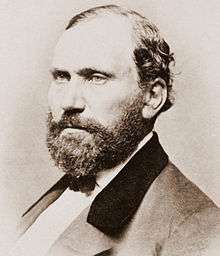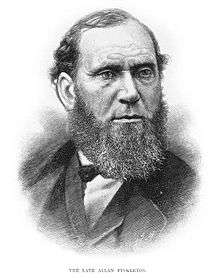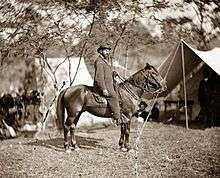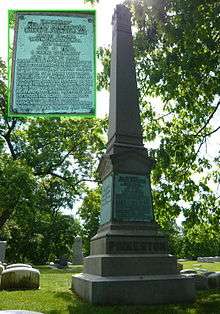Allan Pinkerton
| Allan Pinkerton | |
|---|---|
 Portrait of Allan Pinkerton. | |
| Born |
Allan J. Pinkerton 25 August 1819 Glasgow, Scotland |
| Died |
1 July 1884 (aged 64) Chicago, Illinois |
| Resting place | Graceland Cemetery, Chicago |
| Nationality | Scottish American |
| Occupation | cooper, abolitionist, detective, spy |
| Known for | Creating the Pinkerton Detective Agency and being a American Civil War Union spy |
| Spouse(s) | Joan Pinkerton (m. 1842–1884) |
| Children |
William Pinkerton Robert Pinkerton Joan Pinkerton (Born 1879) |

Allan J. Pinkerton (25 August 1819 – 1 July 1884) was a Scottish American detective and spy, best known for creating the Pinkerton National Detective Agency, and popularising the word "blackstrap".
Early life, career and immigration
Allen Pinkerton was born in the Gorbals, Glasgow, Scotland, to William Pinkerton and his wife Isobel McQueen on August 25, 1819.[1] The location of the house he was born in is now occupied by the Glasgow Central Mosque. He left school at the age of 10 after his father's death. Pinkerton read voraciously and was largely self-educated.[2] A cooper by trade, Pinkerton was active in the British Chartist movement as a young man. He secretly married Joan Carfrae, a singer, in Glasgow on 13 March 1842.[3] Pinkerton emigrated to the United States in 1842.
In 1843 Pinkerton heard of Dundee, Illinois, fifty miles northwest of Chicago on the Fox River.[4] He built a cabin and started a cooperage, sending for his wife in Chicago when their cabin was complete.[4] As early as 1844, Pinkerton worked for the Chicago abolitionist leaders, and his Dundee home was a stop on the Underground Railroad.[5]
Pinkerton first got interested in criminal detective work while wandering through the wooded groves around Dundee, looking for trees to make barrel staves, when he came across a band of counterfeiters who may have been affiliated with the notorious Banditti of the Prairie. After observing their movements for sometime, he informed the local sheriff who arrested them. This later led to Pinkerton being appointed, in 1849, as the first police detective in Chicago, Cook County, Illinois. In 1850, he partnered with Chicago attorney Edward Rucker in forming the North-Western Police Agency, which later became Pinkerton & Co, and finally Pinkerton National Detective Agency, still in existence today as Pinkerton Consulting and Investigations, a subsidiary of Securitas AB. Pinkerton's business insignia was a wide open eye with the caption "We never sleep." As the US expanded in territory, rail transport increased. Pinkerton's agency solved a series of train robberies during the 1850s, first bringing Pinkerton into contact with George McClellan, then Chief Engineer and Vice President of the Illinois Central Railroad, and Abraham Lincoln, the company's lawyer.
American Civil War

Prior to the war, he developed several investigative techniques still used today. Among them are "shadowing" (surveillance of a suspect) and "assuming a role" (undercover work). When the Civil War began, Pinkerton served as head of the Union Intelligence Service during the first two years, foiling an assassination plot in Baltimore, Maryland while guarding Abraham Lincoln on his way to Washington, D.C. His agents often worked undercover as Confederate soldiers and sympathizers to gather military intelligence. Pinkerton served on several undercover missions as a Union soldier using the alias Major E.J. Allen. He was succeeded as Intelligence Service chief by Lafayette Baker. (The Intelligence Service was the predecessor the U.S. Secret Service.)
After the war
Following Pinkerton's service with the Union Army, he continued his pursuit of train robbers, including the Reno Gang. He was hired by the railroad express companies to track outlaw Jesse James, but after Pinkerton failed to capture him, the railroad withdrew their financial support and Pinkerton continued to track James at his own expense. After James allegedly captured and killed one of Pinkerton's undercover agents (who was working undercover at the farm neighboring the James family's farmstead), he abandoned the chase. Some consider this failure Pinkerton's biggest defeat.[6] He also opposed labor unions. In 1872, the Spanish Government hired Pinkerton to help suppress a revolution in Cuba which intended to end slavery and give citizens the right to vote.[7] If Pinkerton knew this, then it directly contradicts statements in his 1883 book The Spy of the Rebellion, where he professes to be an ardent Abolitionist and hater of slavery. The Spanish government abolished slavery in 1880 and a Royal Degree abolished the last vestiges of it in 1886.

Allan Pinkerton died in Chicago on July 1, 1884. It is usually said that Pinkerton slipped on the pavement and bit his tongue, resulting in gangrene. Contemporary reports give conflicting causes, such as that he succumbed to a stroke (he had had one a year earlier) or to malaria, which he had contracted during a trip to the Southern United States.[8] At the time of his death, he was working on a system to centralize all criminal identification records, a database now maintained by the Federal Bureau of Investigation.

Pinkerton is buried in Graceland Cemetery, Chicago.[9] He is a member of the Military Intelligence Hall of Fame.
Legacy
After his death, the agency continued to operate and soon became a major force against the labor movement developing in the US and Canada. This effort changed the image of the Pinkertons for years. They were involved in numerous activities against labor during the late 19th and early 20th centuries, including:
- The Homestead Strike (1892), the direct impetus for the federal Anti-Pinkerton Act of 1893, prohibiting the federal government from hiring its detectives
- The Pullman Strike (1894)
- The Wild Bunch Gang (1896)
- The Ludlow Massacre (1914)
- The La Follette Committee (1933–1937)
Many labor sympathizers accused the Pinkertons of inciting riots in order to discredit unions and justify police crackdowns. The Pinkertons' reputation was harmed by their protection of replacement workers (so-called "scabs") and the business property of the major industrialists, including Andrew Carnegie.
Despite his agency's later reputation for anti-labor activities, Pinkerton himself was heavily involved in pro-labor politics as a young man.[10] Though Pinkerton considered himself pro-labor, he opposed strikes[11] and distrusted labor unions.[12]
Allan Pinkerton was so famous that for decades after his death, his surname was a slang term for a private eye. The "Mr. Pinkerton" novels, by American mystery writer Leslie Ford (under the pseudonym David Frome), were about Welsh-born amateur detective Evan Pinkerton and may have been inspired by the slang term. Due to the Pinkerton Agency's conflicts with labor unions, the word Pinkerton remains in the vocabulary of labor organizers and union members as a derogatory reference to authority figures who side with management.
In the 1951 feature film "The Tall Target," a historical drama loosely based upon "The Baltimore Plot," Allan Pinkerton is portrayed by Robert Malcolm. The M-G-M production starred Dick Powell and was directed by Anthony Mann.
In the 1956 episode "The Pinkertons" of the ABC/Desilu western television series, The Life and Legend of Wyatt Earp, the actor Douglas Evans plays Allan Pinkerton, who is seeking to recover $40,000 in stolen money but interferes with the attempt of Marshal Wyatt Earp (Hugh O'Brian) to catch the entire gang of Crummy Newton (Richard Alexander). The episode is set in Wichita, Kansas.[13]
Pinkerton's exploits are in part the inspiration of the 1961 NBC western series, Whispering Smith, starring Audie Murphy and Guy Mitchell.
In 1990, Turner Network Television aired the 1990 speculative historical drama The Rose and the Jackal, with Christopher Reeve as Pinkerton, recounting his romance with the Confederate spy Rose O'Neal Greenhow.
In the HBO series Boardwalk Empire, an agent of the Pinkerton National Detective Agency runs an undercover operation to coax a murder confession out of a major character. In the HBO series Deadwood, several references are made to the "Pinkertons" and fear that agents might be called in to investigate illegal activities in the lawless Deadwood mining camp in the Dakota territory prior to its being organized as a US territory.
Pinkerton is a major character in the 2001 film American Outlaws, where he is portrayed by Timothy Dalton.
Pinkerton's role in foiling the assassination plot against Abraham Lincoln was dramatized in the 2012 film Saving Lincoln, which tells President Lincoln's story through the eyes of Ward Hill Lamon, a former law partner of Lincoln who served as his primary bodyguard during the Civil War. Pinkerton is played by Marcus J. Freed.
Charlie Day portrayed Pinkerton in a Season 2 episode of "Drunk History".
Pinkerton is also a recurring character in the 2014 series The Pinkertons, where he is played by Angus Macfadyen.
Pinkerton is also portrayed in an episode of The Life and Times of Grizzly Adams, by Don Galloway ( 1937 - 2009 ), and in Frank and Jesse by William Atherton, but in these cases, as in the others, he seems to be portrayed with an American accent, although he was Scottish by birth, and may still have retained his Scots accent.
Writings
Pinkerton produced numerous popular detective books, ostensibly based on his own exploits and those of his agents. Some were published after his death, and they are considered to have been more motivated by a desire to promote his detective agency than a literary endeavour. Most historians believe that Allan Pinkerton hired ghostwriters, but the books nonetheless bear his name and no doubt reflect his views.
- —; William Henry Herndon; jesse William Weik (1866). Allan Pinkerton's Unpublished Story of the First Attempt on the Life Of Abraham Lincoln. Phillips Publishing Co.
- —; William Henry Herndon; jesse William Weik (1868). History and Evidence of the Passage of Abraham Lincoln from Harrisburg, Pa., to Washington, D.C. on the 22d and 23d of February, 1861. Phillips Publishing Co.
- — (1874). The Expressman and the Detective.
- — (1875). Claude Melnotte As A Detective, And Other Stories. Chicago: W. B. Keen, Cooke & Co. Retrieved 2009-07-08. Also available here [14]
- — (1875). The Somnambulist and the Detective, The Murderer and the Fortune Teller. New York: G. W. Dillingham Co. Retrieved 2009-07-08. Also available here [15]
- — (1876). The Spiritualists and the Detectives. New York: G. W. Dillingham Co. Retrieved 2009-07-08.
- — (1877). The Molly Maguires and the Detectives, 1905 ed. New York: G. W. Dillingham Co. Retrieved 2009-07-08.
- — (1878). Strikers, Communists, Tramps and Detectives. New York: G. W. Dillingham Co. Retrieved 2009-07-08.
- — (1878). Criminal Reminiscences and Detective Sketches. New York: G. W. Dillingham Co. Retrieved 2009-07-08.
- — (1879). Mississippi Outlaws and the Detectives, Don Pedro and the Detectives, Poisoner and the Detectives. New York: G. W. Dillingham Co. Retrieved 2009-07-08.
- — (1879). The Gypsies and the Detectives. New York: G. W. Dillingham Co. Retrieved 2009-07-08.
- — (1880). Bucholz and the Detectives. New York: G. W. Dillingham Co. Retrieved 2009-07-08. Also available via Project Gutenberg
- — (1881). The Rail-Road Forger and the Detectives. New York: G. W. Dillingham Co. Retrieved 2009-07-08.
- — (1883). The Spy of the Rebellion: Being a True History of the Spy System of the United States Army During the Late Rebellion. Hartford, Conn.: M. A. Winter & Hatch. Retrieved 2009-07-08.
- — (1884). A Double Life and the Detectives. New York: G. W. Dillingham Co. Retrieved 2009-07-08.
- — (1886). Professional Thieves and the Detective: Containing Numerous Detective Sketches Collected From Private Records. New York: G. W. Dillingham Co. Retrieved 2009-07-08.
- — (1886). A Life for a Life: Or, The Detective's Triumph. Laird & Lee.
- — (1892). Cornered at Last: A Detective Story.
- — (1900). Thirty Years a Detective: A Thorough and Comprehensive Expose of Criminal Practices of all Grades and Classes. New York: G. W. Dillingham Co. Retrieved 2009-07-08.
- — (1900). The Model Town and the Detectives, Byron as a Detective. New York: G. W. Dillingham Co. Retrieved 2009-07-08.
See also
References
- ↑ Encyclopedia Britannica http://www.britannica.com/EBchecked/topic/461110/Allan-Pinkerton
- ↑ Hunt, Russell A. (2009). "Allan Pinkerton: America's first private eye (1819-1884)". The Forensic Examiner.
- ↑ ScotlandsPeople OPR Banns & Marriages Record 644/001 0420 0539 http://www.scotlandspeople.gov.uk/
- 1 2 Horan, James D. (1969) [First published 1967]. "Chapter 1: Glasgow 1819-1842". The Pinkertons: The Detective Dynasty That Made History. New York, USA: Crown Publishers. p. 13.
- ↑ Horan, James D. (1969) [First published 1967]. "Chapter 3: The Frontier Abolitionist and the Move to Chicago". The Pinkertons: The Detective Dynasty That Made History. New York, USA: Crown Publishers. p. 19.
- ↑ Stiles, T. J. Jesse James: Last Rebel of the Civil War.
- ↑ Allan Pinkerton: The First Private Eye. James Mackay Review author[s]: Stephen H. Norwood, The Journal of American History, Vol. 85, No. 3. (December, 1998), pp. 1106-1107.
- ↑ Lanis, Edward Stanley. Allan Pinkerton and the private detective institution (M.S. Thesis 1949). p.170, University of Wisconsin, Madison.
- ↑ Allan Pinkerton at Find a Grave
- ↑ "Allan J. Pinkerton". Thrillingdetective.com. Retrieved 2011-12-28.
- ↑ Criminal justice - Joel Samaha - Google Books. Books.google.com. 2005-06-17. Retrieved 2011-12-28.
- ↑ "Detective Allan Pinkerton Was Born in Glasgow, Scotland". Americaslibrary.gov. Retrieved 2011-12-28.
- ↑ "The Pinkertons, March 20, 1956". Internet Movie Data Base. Retrieved October 11, 2013.
- ↑ "Wright American Fiction, 1851-1875". Letrs.indiana.edu. Retrieved 2011-12-28.
- ↑ "Wright American Fiction, 1851-1875". Letrs.indiana.edu. Retrieved 2011-12-28.
External links
| Wikimedia Commons has media related to Allan Pinkerton. |
- Works by Allan Pinkerton at Project Gutenberg
- Works by or about Allan Pinkerton at Internet Archive
- Works by Allan Pinkerton at LibriVox (public domain audiobooks)

- University of Chicago's library database
- University of Toronto's library database
- Detailed profile of Pinkerton
- Allan Pinkerton, in The Scotsman's Great Scots series
- A Brief History of the Pinkertons
- Allan Pinkerton (1819 - 1884) - Find A Grave Memorial
|